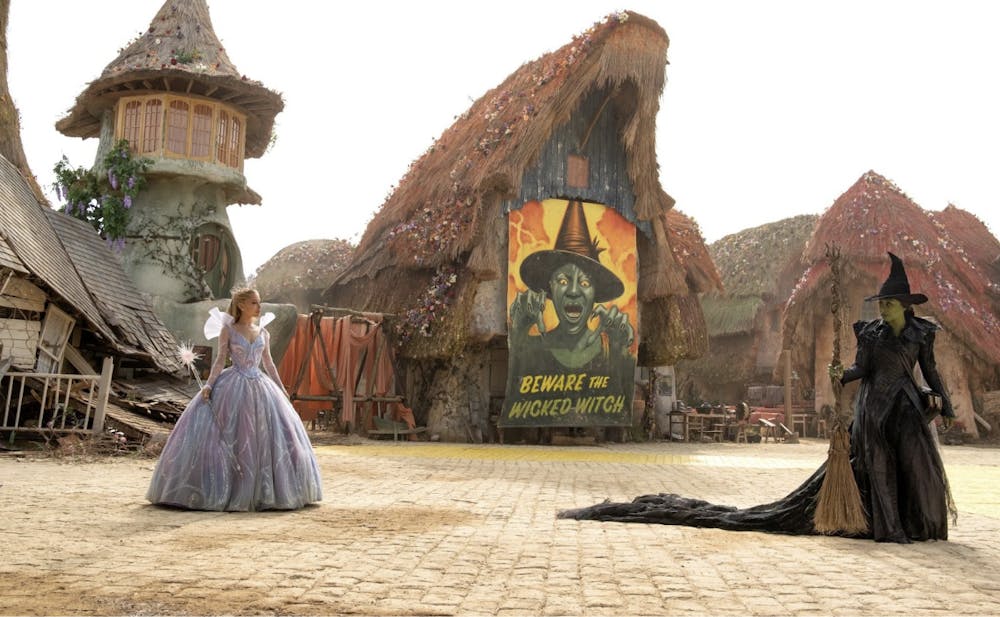By AJ Mun
Staff Writer
In “Wicked: Part One,” we are able to see the untold origin stories of the classic witches of Oz. Through frilly songs such as “Popular” and “What is this feeling?” the film holds a lighthearted and nostalgic air about it, but fans of the full story know that it couldn't be more opposite when examining “Wicked: For Good.”
When we left the first film, our heroine painted villain Elphaba Thropp fled the Emerald City after discovering her mentor, Madam Morrible, and her idol, The Wizard, were responsible for the silencing and capturing of animals in Oz. While Glinda stays behind in the Emerald City, embraced by Morrible, Elphaba flies off into the sunset, determined to change the way that things are.
While we don't know exactly how big director Jon M. Chu will make the time jump between the first and second film, it's assumed that anywhere between three to five years has passed since the two witches had seen each other. Glinda is now a public figure and the personification of goodness to the people of Oz, whereas Elphaba is hated and feared, now labeled as the Wicked Witch of the West.
With the animals now being kept in cages and extorted to work, Elphaba is determined to stop the construction of the yellow brick road and to expose The Wizard for the fraud that he is. Though Glinda is somewhat blissfully unaware of the happenings in Oz, she feels as if it is all out of her control and she's doing what she can to lift the spirits of the people of Oz.
While there is no city made of emeralds and no one is exactly flying around writing messages in the clouds, one cannot help but notice the parallels between Oz and the United States. The concept of a con man slowly stripping certain groups of their voices and their freedoms is something both Ozians and Americans can understand. More and more every day we see members of the marginalized groups being silenced. Americans, both documented and not, are being kept in cages much like the animals of Oz. With places such as Alligator Alcatraz existing in our current climate, can we really turn a blind eye anymore?
I recall the scene from “Wicked: Part One” where Dr. Dillamond, an esteemed professor, was brutally taken from inside his own classroom and never seen again for the rest of the film. This scene struck me specifically because we’re now seeing Latin Americans being ripped from their homes, their cars, their schools and their jobs, to be handcuffed and mistreated until they are ultimately shipped off to a different country that they've never known.
While I love the Glinda character, we must see her as Elphaba does. Someone who knows of the issues going on around them and yet chooses compliance as it benefits them and their position. We see this a lot with some of the wealthier upper class citizens who benefit from President Donald Trump's tax cuts and policy changes. Much like The Wizard and Madam Morrible though, Trump isn’t working in the benefit of anyone but himself. While she was complacent, Glinda comes to her senses by the end of the Wicked story and makes things right. Vowing to work hard to truly become “good.”
As a people, we should all try to be more like our favorite green witch Elphaba, and use our voices, power and identities to fight for what we believe in. What happens when our little bubbles burst and we can’t just ignore the injustices around us? Glinda doesn’t wake up to the dark side of things happening until it directly affects her, seeing how the smear campaign against her best friend goes too far and calls for a witch hunt.
More and more we see small “coincidences” of people being silenced for speaking out. Judges’ houses being burned. Talk show hosts being pulled off air. Unlawful arrests and detentions being made in the streets and outside of schools. At what point though do we call out our “Wizard” for the con man that he is. A liar, a thief, and an insecure criminal. All of those adjectives seemingly relate to both Oz’s leader… and ours.
In “Wicked: Part One,” Dr. Dillamond says “It’s happening. You’ll find if you make it discouraging enough, you can keep anyone silent.” Nothing reigns more true in our society. Many people of color are scared to be alone outside of their homes in fear that they will be taken away, never to see their families again.
It’s as Elphaba Thropp says “...no one should be laughed at, or scorned or told to keep quiet.” In our current climate it's more important than ever to use your voice to stand up for what we believe in. If we’re complacent for too long, a house just might drop on us next.







